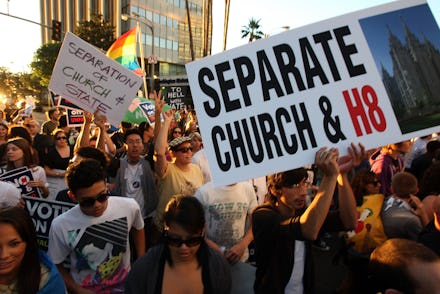The Mormon Church's "New" Support for LGBT Protections Isn't New — Or Groundbreaking

The Church of Jesus of Christ of Latter-day Saints has officially pledged to support anti-discrimination laws for LGBT Americans — for a price.
In a press conference held outside the unimaginatively named Church Office Building in Salt Lake City, Elder Dallin Oaks, a member of the church's Quorum of the Twelve Apostles, announced that the Mormon church will officially pressure "local, state and the federal government to serve all of their people by passing legislation that protects vital religious freedoms for individuals, families, churches and other faith groups while also protecting the rights of our LGBT citizens in such areas as housing, employment and public accommodation in hotels, restaurants and transportation — protections which are not available in many parts of the country."
It's a cause the church has pushed for before, at least locally. In December 2014, the church issued a statement on its official website expressing support for workplace and housing protections for LGBT Utahns, although the statement was later altered to limit that support to a local Salt Lake City ordinance passed five years previously.
But the church wants something in exchange for its newfound sense of decency. Namely, for LGBT groups and individuals to stop calling out its past bigotry.
"When religious people are publicly intimidated, retaliated against, forced from employment or made to suffer personal loss because they have raised their voice in the public square, our democracy is the loser. Such tactics are every bit as wrong as denying access to employment, housing or public services because of race or gender," Oaks said. "It is one of today's great ironies that some people who have fought so hard for LGBT rights now try to deny the rights of others to disagree with their public policy proposals."
This "gays are the real bullies" trope is neither accurate nor imaginative. The church joins the echochamber of organizations decrying the "intolerance of intolerance," warning that the oppressed (read: gay people) have become the oppressors. When Brendan Eich, the short-lived CEO of Mozilla, stepped down after two weeks of criticism over a $1,000 donation he made in support of California's Proposition 8, conservatives denounced the critics as the "real bullies."
After Arizona Gov. Jan Brewer vetoed a bill that would have allowed businesses to refuse service to gay people, then-Congresswoman Michele Bachmann cited the bill's failure as evidence that LGBT activists had "bullied" voters and politicians.
"I think the thing that is getting a little tiresome, the gay community, they have so bullied the American people, and they've so intimidated politicians," Bachmann said in a radio interview. "The politicians fear them, so that they think they get to dictate the agenda everywhere."
Bullying is when a stronger person picks on a weaker person, not when the person being picked on tells the teacher. Confronting church authorities with past, and current, sins isn't just defending LGBT people — it's holding the church accountable for its own actions. The Mormon church has demonstrated willingness to change under public pressure: Just look at how black Mormons were accepted into the church after a century of discrimination, which is perhaps why its declaration of intent is paired with a request to halt that pressure. The pressure works.
Just because the Mormon church is willing to support LGBT Americans on employment and housing discrimination doesn't mean it gets a pass for its entrenched involvement in the Proposition 8 battle in California — half of the $40 million raised in support of the measure was contributed by Mormons or church proxy organizations — or its close ties with organizations that preach "reparative therapy" for gay adults and children. By pointing out these actions for what they are, gays and allies aren't "bullying" the church or anyone else. They're helping put their actions in context, which is good for the church in the end.
As far as the proposal goes, it's a nice gesture, but gestures only go so far. Pope Francis has become something of an expert on this, but public reiterations of existing doctrines and policies as a way of earning cheap PR points don't win battles in the long run. In the end, the only rule the Mormon church needs to hold itself to its most powerful one: the "Golden Rule."